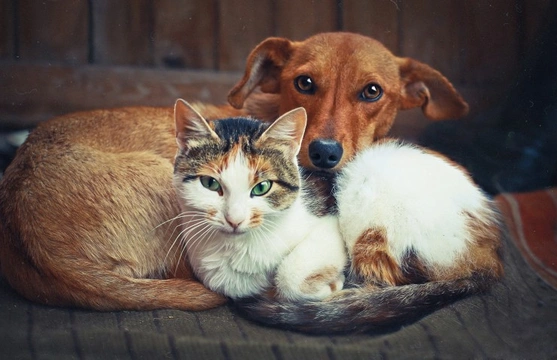
The five greatest similarities between dogs and cats
When you look at a large, working dog breed such as the Japanese Akita next to a small, cute kitten like the Munchkin, you might well think that cats and dogs have very little in common! While cats and dogs differ in a huge variety of ways, such as their nutritional requirements, hunting behaviours and relationship with people, cats and dogs as domesticated animals do have a reasonable amount of things in common, which can make choosing which species is the right pet for you rather hard if you love both cats and dogs!
In this article, we will look at five of the greatest similarities and parallels between the behaviour and core traits of cats and dogs, demonstrating that our two favourite domestic pet species are possibly more alike than you might think! Read on to learn more.
Hunting and scavenging
Both cats and dogs in the wild rely upon a combination of hunting and scavenging to find food, with both species being effective hunters of their respective forms of prey.
While dogs tend to be more opportunistic about where they get their food from than cats, showing little desire to work for food if there is something readily available to them, both species have a strong, innate prey instinct, which will often become apparent even within domestic pets.
Even if your cat or dog has never had to go without a meal or worry about feeding themselves, both species show hunting instincts without ever having to be taught how to, and virtually any breed of cat will be able to catch themselves a mouse if they put their minds to it, while dogs often set their sights on larger and more ambitious prey, particularly when working in packs.
Affinity for people
While we often think that humans tamed cats and dogs and turned them into the pets that we own today, in reality, it was the cats and dogs themselves that initiated their first interactions with humans, moving closer and closer to human settlements several millennia ago.
This meant the beginnings of humanity’s symbiotic relationship with the animals that we now call pets; cats and dogs would benefit from close proximity to human habitation in order to scavenge and find food and stay warm, while humans got the advantage of having dogs to scare off potential threats and help them to hunt, and cats helped to keep the number of rodents and other pests under control around human habitations.
Territorialism
Both cats and dogs display natural territorial instincts, although how this is manifested varies considerably between the species.
While dogs are naturally social animals that form packs in the wild for both companionship and to increase their chances of successful hunting and general survival, cats tend to be loners that do not seek out the company of others aside from when mating, and when caring for their young.
Cats will mark and defend their own perceived territory while also actively avoiding crossing the boundaries into another cat’s area unless they absolutely have to, and dogs too will display distinctive territorial traits, seeing off strange dogs that impinge upon their space.
Ability to survive in the wild
If humanity was wiped out tomorrow, it is definitely true that a reasonable number of our domestic cats and dogs would also perish for the want of someone to care for them and provide them with food.
But if your cat or dog was turned loose in the wild, when they got hungry enough, the majority of animals of both species would ultimately be able to effectively hunt and find food and take care of themselves, without any need for human support! Both cats and dogs when released into the wild or left alone by people will revert to a feral state relatively quickly, and display totally wild behaviour within just a couple of generations.
Affection and bonding
How your cat and your dog show you affection differs considerably between the species, but domesticated cats and dogs both love human company, and form strong bonds with their regular handlers or owners. While the beginnings of this relationship’s basis is food, it also goes much deeper than that, and cats and dogs don’t only stick around in order to guarantee their next meal!
Domestic cats and dogs both need affection, attention and lots of love, although dogs require more constant supervision and are less able to entertain themselves when left alone than cats are.
Dogs naturally gravitate to the company of other dogs too, and enjoy the companionship, affection and mutual benefits of company with canines as well as humans. While cats in the wild tend to avoid the presence of strange cats, adult littermates and the adult kittens of a queen will often share a territory and potentially, stay close by, just as adult cats within a domestic home will often bond with each other and cuddle up together happily.



